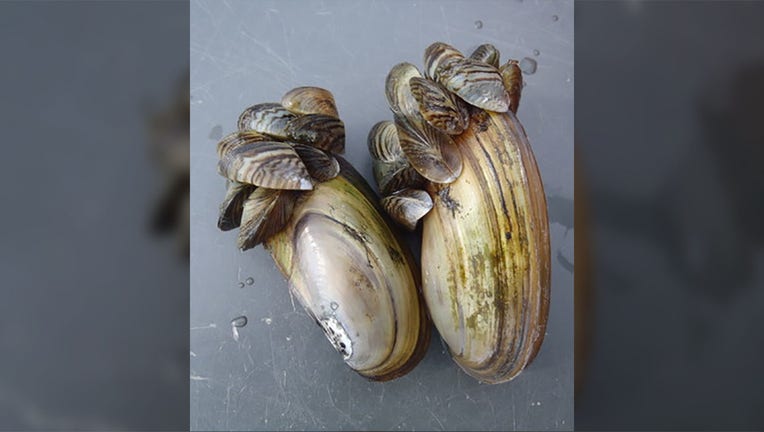DNR: Invasive zebra mussels detected in aquarium 'moss bolls'

Zebra mussels can attach to any hard surface, such as the outside of a native mussels' shell. These native mussels are slowly smothered by the colony of invasive zebra mussels covering the opening of their shells. (Credit: Wisconsin DNR)
MADISON, Wis. - The Wisconsin Department of Natural Resources (DNR) is urging Wisconsinites to immediately remove and properly dispose of commercially purchased "moss balls" for aquariums.
Invasive zebra mussels were discovered inside and on some of these products in Wisconsin and across the U.S.
According to the U.S. Fish and Wildlife Service, zebra mussels are regarded as one of the most destructive invasive species in North America.
The invasive zebra mussels found in "moss balls" are designed for aquarium use and sold under names including "Betta Buddy Marimo Balls" and "Marimo Moss Ball Plant Grab N Go."
Despite their small size, zebra mussels clog pipelines used for water filtration, render beaches unusable and damage boats. They also negatively impact aquatic ecosystems by harming native organisms.
The DNR is working with other states to determine where these products are being sold. Two major pet store chains, Petco and PetSmart, took quick action and removed the products from store shelves once notified. For more information regarding moss ball product recalls, visit Petco and PetSmart.
Wisconsin and other states will continue monitoring the situation to ensure a safe product is made available to the public.
Information on how to safely destroy and dispose of "moss bolls" and drain aquariums is available at dnr.wisconsin.gov.
For more information on the best management practices for decontaminating boats, equipment and gear to prevent the spread of aquatic invasive species (AIS) between waters, visit the DNR’s website.
FREE DOWNLOAD: Get breaking news alerts in the FOX6 News app for iOS or Android.
Featured
Spacewalkers take extra safety precautions for toxic ammonia
Spacewalking astronauts had to take extra safety precautions Saturday after possibly getting toxic ammonia on their suits from the International Space Station's external cooling system.



